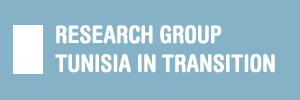Institute for Near and Middle Eastern Studies, Thursday, 10 October 2013
The first session of the Tunisia in Transition Munich Workshop followed up on our first Workshop in Tunis in March 2013, which had been devoted to methodology of the social sciences. This time we turned to the methodology of a different science, namely that of public law. Dr. Martin Heidebach, a lecturer at the Chair of Public and European Law (Prof. Streinz) at the LMU Munich, gave the participants a good insight into a method that revolves mainly around the notion of interpretation.
Public Law, as opposed to Criminal and Civil Law, is concerned with the public authority itself and encompasses Administrative Law and the Constitution as well as the law of the European Union (EU) and the European Convention on Human Rights. As laws are formulated in a general way, the daily business of any lawyer, judge or researcher in law is the interpretation of the law. To exemplify this, Mr. Heidebach quoted Art 1.1 of the German Constitution: “Human dignity shall be inviolable.” From this short phrase, several questions arise. What does, for instance, human dignity mean? And what would a violation of this dignity look like? Furthermore, does the article preclude any violation, or might there be justified exceptions? The most common methods of interpretation are the grammatical, the systematic, the historical and the teleological interpretation. While the historical method takes into consideration documents about the emergence of the law, the teleological interpretation considers first the aim with which a law was designed and interprets it in this sense. For any interpretation, the jurist has to give plausible arguments.
Apart from this, Mr. Heidebach also presented three rather more theoretical ways of research in Public Law: Meta research, research on the state and the newly emerging research on Administrative Law. The first is concerned with investigating the different interpretation methods and is mainly used in the area of fundamental rights and their scope. In state research, jurists work on constitutional history and comparison between states as well as on the general purpose of the state. Ultimately, the new science of Administrative Law has an empirical stance, examining whether administrative laws work in the way they ought to. The protagonist of research in Public Law in Germany, apart from the 50 law faculties, is mainly the publicly funded Max Planck society with seven institutes in the field of Public Law. The Heidelberg based Max Planck Institute for Comparative Public Law and international law also advised the first Tunisian government on the transition. Apart from that, every lawyer, judge and administration contributes to the research with their daily interpretation work. Making reference to the German Causa Guttenberg, Mr Heidemann stressed the importance of correct citation in any article or monograph. As the most common forms of publication, he named the monograph, the commentary, the edited volume and the journal. Lately, some blogs on public law have emerged. Verfassungsblog.de even publishes articles in English from time to time.
To practice what we had just heard, Mr. Heidebach brought a case to class that had just been decided upon by the European Court of Human Rights and which he is currently working on called Ostendorf vs. Germany. The case is concerned with the lawfulness of a preventive detention of a football hooligan gang leader. The participants had a lively discussion on the correct interpretation of the ECHR-articles concerned. The law session was a good start into our Workshop, which was complemented by the visit of the Bavarian Parliament that afternoon, where we had the possibility to discuss state organization, and in particular federalism, with a member of Parliament.
